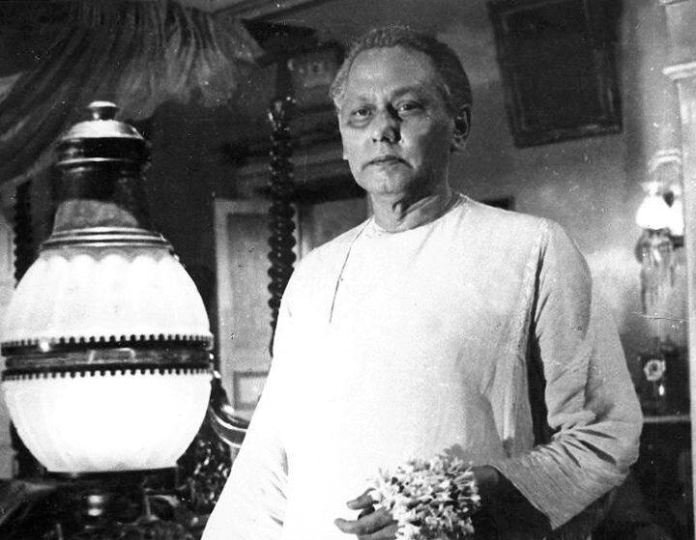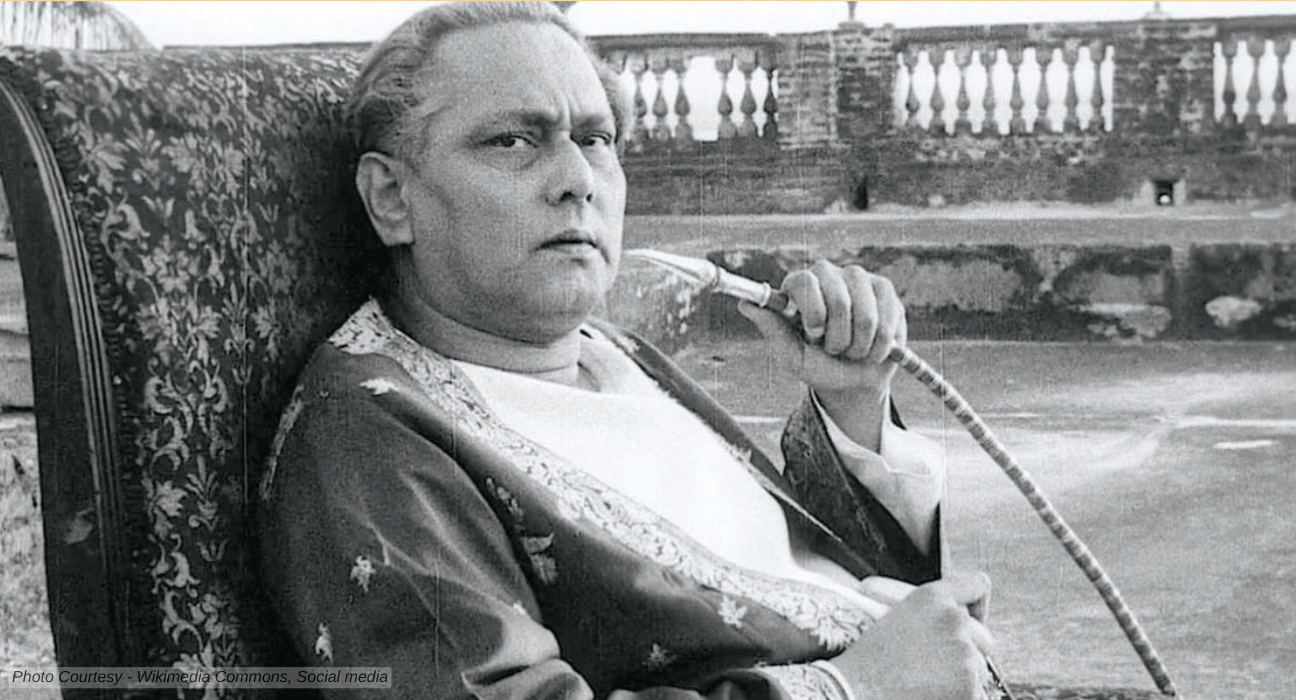The baritone voice, the piercing eyes, and a regal demeanor with an unmatched acting talent made Chhabi Biswas one of the most beloved actors of his time. Biswas emerges as a legendary figure in Indian cinema, renowned for his commanding presence and nuanced performances in films like “Nartaki,” “Ek Din Ratre,” “Saheb Bibi Golam,” “Kabuliwala,” “Jalsaghar,” “Devi,” “Satpadi,” “Dada Thakur,” and many more.
Early Life and Career
Chhabi Biswas was born on July 12, 1900, as Sachindranath Biswas, in North Kolkata. His father, Bhupatinath Biswas, was a wealthy zamindar known for charitable works. His mother nicknamed him Chhabi, meaning “picture (beautiful),” a name that endured. He grew up as the youngest of several siblings in a cultured household in Chhoto Jagulia, later moving to Beadon Street.
Biswas passed his matriculation at Hindu School in Kolkata. He first joined Presidency College for his higher education before shifting to Vidyasagar College, drawn by its proximity to theatrical circles.
Biswas entered theater during college, inspired by Sisir Kumar Bhaduri, a legendary Bengali stage personality. Biswas learned from the Bhaduri and worked with him in various capacities. His breakthrough came with his role as Sri Gouranga in Nader Nimai. The performance gained him recognition among theater enthusiasts. He briefly left acting to work in an insurance company and later a jute business but returned to the stage with his professional debut in the play Samaj. Biswas remained active in theater throughout his life. Some of his famous plays include Shoroshi (1940), Sita (1940), Kedar Roy (1941) and Shahjehan (1941). Apart from modern theater, he also worked in Jatra. He also did the stage adaptations of novels like Devdas, Kashinath, Siraj-ud-Dowla.
Chhabi Biswas In Films

Chhabi Biswas made his film debut with Annapurnar Mandir (1936), directed by Tinkari Chakraborty. Biswas starred in Satu Sen’s adaptation of Rabindranath Tagore’s Chokher Bali (1938), also starring Haren Mukherjee and Suprava Mukherjee. In the film he portrayed the role of Bihari. He portrayed the role of Sikandar in Sisir Kumar Bhaduri in Chanakya (1939).
In 1940 he starred in New Theatres’s “Nartaki,” directed by Debki Bose. In the film he played the role of a very old Swamiji and got widespread acclaim for it. After Nartaki, he apeared in many films of New Theatres, like “Pratisruti (1941)” and “Saugandh (1942),” both directed by Hemchandra Chunder; Premankur Atorthy’s “Dikshul(1943),” Subodh Mitra’s “Dui Purush (1945)“; and many more.
Some of his other notable films in the 40s include Prafulla Roy’s Nari (1942), Niren Lahiri’s Mahakabi Kalidas (1942), Pasupati Chatterjee’s Parineeta (1942), Jyotish Bannerji’s Milan (1942), Ajay Bhattacharya’s Ashok (1942), Hemen Gupta’s Dwanda (1943), Premendra Mitra’s Samadhan (1943), Hari Bhanja’s Matir Ghar (1944), Ajay Bhattacharya’s Chhadmabeshi (1944), and many more.
In 1944, he turned director with “Pratikar,” starring himself with Kanu Bannerjee, Jiben Bose, Phani Burma, Sailen Choudhury, and Bandana Devi. SD Burman gave the music for the film. His second film as a director was “Jar Jetha Ghar,” which came out in 1949. It starred Chhabi Biswas with Sarajubala Devi and Pahadi Sanyal.
Some of his other films in the late 1940s are Amar Mullick’s Biraj Bau (1946), Subodh Mitra’s Nurse Sisi (1947), Debaki Bose’s Chandrasekhar (1947), Dhirendranath Ganguly’s Shesh Nibedan (1948), Niren Lahiri’s Sadharan Meye (1948), Satish Dangupta’s Debi Chowdhurani (1949), Subodh Mitra’s Manzoor (1949), Nitin Bose’s Drishtidan (1948), Ratan Chatterjee’s Mandana (1950), and Kali Prasad Ghosh’s Vidyasagar (1950).
Chhabi Biswas The Bengali Bhadralok
By the 1950s, Chhabi Biswas had become one of Bengali cinema’s top character actors. He was known for his unique booming and his image of Bengali Bhadralok. He played roles of powerful aristocratic patriarchs to perfection. With his deep baritone voice, his eyes and overall person, he suits the characters he played to the hilt.
In this period, one of his most fruitful collaborations was with Niren Lahiri. He worked in Lahiri’s Subhada (1952), Lakh Taka (1953), Jadubhatta (1954), Shobha, Kalyani, Debi Malini (1955), Shankar Narayan Bank (1956), Bhola Master (1956), Prithibi Amare Chay (1957), Bara Maa (1957), Tansen (1958), Indrani (1958), and Chhabi (1959).


In 1953, he starred in Sukumar Dasgupta’s Saat Number Kayedi with Suchitra Sen, Kamal Mitra, Molina Devi and Bhanu Banerjee. The film was based on Diptendra Sanyal’s story and was the first release of Suchitra Sen. He then starred in Sukumar Dasgupta’s Sadanander Mela (1954), Ora Thake Odhare (1954), Parishodh (1955), Abhoyer Biye (1957), and Haat Baralei Bandhu (1960).
Chhabi Biswas – The Legend
He worked with Mrinal Sen in his Raat Bhore (1955) alongside Uttam Kumar and Sabitri Chatterjee. The same year he worked with Uttam Kumar and Suchitra Sen in Agradoot’s Sabar Uparey. Agradoot repeated the same team in his Trijama (1956), Pathe Holo Deri (1957), Surya Toran (1958), and Bipasha (1962).
One of his most important films was “Saheb Bibi Golam (1956),” directed by Kartick Chattopadhyay. He played the sinister landlord Mejo Babu, who ordered the murder of Chhoti Bou. In 1956 he acted in Sombhu Mitra’s classic Ek Din Ratre (Jagte Raho in Hindi), starring Raj Kapoor. His acting as the lovable but cynical drunk, singing “Ei Duniaye Shobi Hoi,” is still remembered by his fans.
Kabuliwala
In 1955 he starred in Tapan Sinha’s “Uphaar.” Tapan Sinha again teams up with Chhabi Biswas for Kabuliwala, the adaptation of Rabindranath Tagore’s story. Biswas plays Rehmat Khan, an Afghan fruit seller who forms a bond with Mini, a young Bengali girl, portrayed by adorable Tinku Tagore. The plot focused on Rehmat’s nostalgia for his daughter back home and his arrest after a dispute. Biswas brings immense depth to the character with his nuanced portrayal, measured dialogue and expressive eyes. The film won the National Film Award for Best Feature Film. It also got the Silver Bear Extraordinary Prize of the Jury at the Berlin Film Festival.
Jalsaghar
Chhabi Biswas first worked with Satyajit Ray in Parash Pathar (1958) in a small role. The same year, Ray cast him in Jalsaghar (1958). Biswas portrays Biswambhar Roy, a zamindar whose obsession with hosting musical soirees leads to financial ruin. The story unfolds as Roy clings to tradition amid a changing society, with his family facing hardship. Biswas delivers a commanding performance, using his baritone voice to convey pride and despair. The film’s music, by Vilayat Khan, enhances the cultural backdrop. It received a Special Jury Mention at Venice.
Devi
Biswas again worked with Satyajit Ray in Devi (1960), where he plays Kalikinkar Roy, a wealthy Bengali landlord who believes his daughter-in-law, Doyamoyee (Sharmila Tagore), is an incarnation of Goddess Kali. The plot explores religious fanaticism as Kalikinkar’s faith leads to tragic consequences, including Doyamoyee’s mental breakdown.
Biswas portrays the character with a mix of devotion and delusion, relying on his theatrical training. The film’s score by Ali Akbar Khan highlighted its spiritual tone. The film won the President’s Silver Medal at the National Film Awards. Biswas’s performance drew praise for its psychological complexity.

Later Work
He also acted in Kanchenjungha (1962), Ray’s first color film, which portrays him as Indranath Chaudhuri, a domineering patriarch. He also acted in Ajay Kar’s iconic romance “Saptapadi (1961),” with Suchitra Sen and Uttam Kumar. The film was based on anovel by Tarasankar Bandyopadhyay and tells the love story between a Hindu boy and a Christian Anglo-Indian girl. Chabbi Biswas played the staunch Hindu father of the boy who was against the match.
Some of his other notable films include Premendra Mitra’s Chupi Chupi Ase (1960), Sudhir Mukherjee’s Shesh Prayanta (1960), Chitta Bose’s Maa (1961), Bijoli Baran Sen Manik (1961), Bikash Ray’s Carey Saheber Munshi (1961), Agradoot’s Agni Sanskar (1961), Chitta Bose’s Shubhoddristi (1962), Sudhir Mukherjee’s Dada Thakur (1962), Ajay Kar’s Atal Jaler Ahwan (1962), and many more.
Biswas mastered a unique dialogue delivery, starting in English before repeating in Bengali, honed from his theater days. He prepared by observing Bhaduri’s techniques, focusing on voice modulation and expression. His process involved minimal rehearsal, relying on instinct and scene context. He excelled in patriarchal roles, using his baritone to convey authority, though he avoided typecasting by exploring diverse characters.
Personal Life and Legacy
Biswas won the Sangeet Natak Akademi Award in 1960. He was one of the favorite actors of Satyajit Ray, who praised him for his skills on a number of occasions. His nickname “Huzur” came from Ray, reflecting his regal aura. He co-founded Abhinetri Sangha to support actors’ rights.
Biswas married Geeta, with whom he had sons, Dilip and Malay, and daughter Manjula. His grandson, Sujoy, who shared insights on his life.
He died on June 11, 1962, in a car accident near Jagulia at 61, leaving a void in Bengali cinema. According to a media report, Satyajit Ray said after his demise that he “would never be able to pen down a male middle-aged role that demanded a high degree of acting expertise, because only Biswas could deliver the same.”
Chhabi Biswas on IMBD













Leave feedback about this